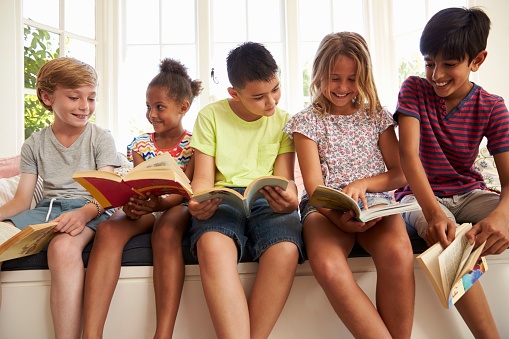
The school year is finally winding down and it’s a been tough one. We’ve had deep and difficult conversations in classrooms sparked by divisive elections, social tensions, and rising incidents of hate in the US and around the world. Events from this past year prompted Facing History to ask “What Makes Democracy Work?” in our weekly series exploring democracy, leadership, and civic responsibility. And we know that even as class lets out for the summer, we’ll all still have lingering questions about these issues on our minds.
That’s why we partnered with School Library Journal to create a book list that helps us all—educators, students, and parents—reflect on these questions over the summer months. “Foundations for Future Voters: Books on Democracy and Citizenship” provides over 30 titles of fiction and nonfiction for readers of all different grade levels. Educators can use the list to identify new selections for their classrooms and additions to school libraries. Parents and young people can find meaningful summer choices that connect to current events and continue thoughtful conversations on long car trips or around the dinner table.
Reading and discussing stories like the ones on this list is an important part of what makes democracy work. “These stories undoubtedly prompt discussion and exploration of one’s own place and time, and our own role in fostering an equitable world,” says Kathy Ishizuka, executive editor of School Library Journal. “There’s a real emotional quotient here for readers young and old alike. And we need empathy, now more than ever.”
Here are four titles that I’m especially looking forward to sharing and discussing with my own family:
We the Kids: The Preamble to the Constitution of the United States by David Catrow (K-Grade 5)
“The dry, difficult words from the Preamble to the Constitution are made easy to understand through wild, wacky, full-color art. After a foreword and a page of definitions, Catrow uses his witty style to encourage kids to giggle and then claim ownership of the famous words and the basic concepts they ensure.”
Amina’s Voice by Hena Khan (Grades 4-6)
“In a quiet Milwaukee suburb, Amina and her best friend Soojin grapple with their own ethnic identities and the pressure to "Americanize.” Soojin is Korean American and on the pathway to citizenship. She’s contemplating changing her name to solidify her American identity, while Amina, who’s Pakistani-American, must reconcile her love of singing Motown with her Muslim faith. When the neighborhood mosque is burned and vandalized, the greater community comes together.”
Alexander Hamilton: The Making of America by Terri Kanefield (Grades 5-8)
“An informative yet accessible biography of the famed Founding Father for a middle school audience. Kanefield succeeds in revealing the often contentious differences among the various political and economic philosophies during the early decades of the American Republic, including the distinction between Hamilton’s mercantilism and Thomas Jefferson’s agrarianism. Key concepts, like the Articles of Confederation and mercantilism, are explained in sidebars.”
All American Boys by Jason Reynolds and Brendan Kiely (Grades 8 and up)
“Rashad Butler is a quiet, artistic teen who heads to Jerry’s corner store on a Friday night to buy chips, and ends up the victim of unwarranted arrest and police brutality: an event his white schoolmate Quinn Collins witnesses in horrified disbelief. Reynolds and Kiely’s collaborative effort is a deft exploration of the aftermath of police brutality, addressing the fear, confusion, and anger that affects entire communities.”
Make sure to explore the entire “Foundations for Future Voters” booklist for more great recommendations. And join us in the comments section and on social media with the hashtag #DemocracyAndUs to share your own recommendations of books with themes of citizenship and democracy. What other titles should we add to our summer reading lists?


